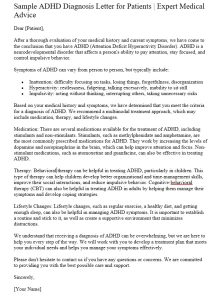Navigating An Adult ADHD Diagnosis: Help And Resources

Table of Contents
Understanding Your Adult ADHD Diagnosis
What Adult ADHD Really Means:
Adult ADHD, also known as Attention-Deficit/Hyperactivity Disorder, is a neurodevelopmental disorder that persists into adulthood. Unlike childhood presentations, where hyperactivity is often more prominent, adult ADHD symptoms can manifest differently. Core symptoms often include:
- Inattention: Difficulty focusing, losing things frequently, easily distracted, struggling to complete tasks.
- Hyperactivity: Restlessness, fidgeting, excessive talking, difficulty sitting still. This can present as internal restlessness in adults.
- Impulsivity: Acting without thinking, interrupting conversations, difficulty waiting one's turn, making rash decisions.
- Challenges with organization and time management: Procrastination, difficulty prioritizing tasks, poor planning skills.
- Emotional regulation difficulties: Experiencing intense emotions, difficulty managing stress, mood swings.
The presentation of ADHD in adults is highly varied. Some individuals may primarily struggle with inattention, while others experience more hyperactive-impulsive symptoms. Many adults exhibit a combination of both.
Common Misconceptions about Adult ADHD:
Many myths and stigmas surround adult ADHD, hindering individuals from seeking help. Let's address some common misconceptions:
- Myth: ADHD is just for children. Reality: ADHD is a neurodevelopmental disorder that often persists into adulthood. Many adults are undiagnosed and struggle with its symptoms throughout their lives.
- Myth: ADHD is a lack of willpower. Reality: ADHD is a neurological condition affecting brain function, not a lack of discipline or motivation. Individuals with ADHD often want to improve their focus and organization, but struggle to do so due to neurological differences.
- Myth: Medication is the only solution. Reality: While medication can be a very helpful part of an ADHD treatment plan for many, it's not the only solution. Therapy, lifestyle changes, and self-management techniques are also crucial for effective management.
The Importance of a Comprehensive Evaluation:
A proper diagnosis from a qualified professional is essential for effective management of Adult ADHD. This involves a thorough evaluation to rule out other conditions and determine the severity of symptoms.
- Types of professionals: Psychiatrists, psychologists, and neuropsychologists are qualified to conduct ADHD assessments.
- What to expect during an assessment: Assessments may include interviews, questionnaires, and neuropsychological testing.
- Benefits of a thorough evaluation: Accurate diagnosis, personalized treatment plan, and access to support and resources.
Treatment Options for Adult ADHD
Medication Management for ADHD:
Medication can significantly improve ADHD symptoms for many adults. Various medications are available, each with its own benefits and side effects. It's crucial to work closely with a prescribing physician to find the right medication and dosage.
- Stimulants (e.g., methylphenidate, amphetamine): These medications increase dopamine and norepinephrine levels in the brain, improving focus and reducing impulsivity. Potential side effects can include insomnia, decreased appetite, and increased heart rate.
- Non-stimulants (e.g., atomoxetine): These medications work differently than stimulants, affecting norepinephrine levels. They may have fewer side effects for some individuals but can take longer to become effective.
- Importance of physician collaboration: Regular monitoring and adjustments are essential to optimize treatment and minimize side effects.
Therapy and Behavioral Interventions:
Therapy plays a crucial role in managing ADHD symptoms beyond medication. Different therapeutic approaches can address specific challenges.
- Cognitive Behavioral Therapy (CBT): Helps individuals identify and change negative thought patterns and behaviors that contribute to ADHD symptoms.
- Coaching: Provides personalized guidance and support in developing effective coping strategies and self-management skills.
- Support groups: Offer a safe space to connect with others who understand the challenges of living with ADHD.
Lifestyle Changes and Self-Management Techniques:
Lifestyle adjustments can significantly impact ADHD symptom management.
- Sleep hygiene: Establishing a consistent sleep schedule and creating a relaxing bedtime routine.
- Diet: Eating a balanced diet and minimizing processed foods, sugar, and caffeine.
- Exercise: Regular physical activity can improve focus and reduce hyperactivity.
- Mindfulness techniques: Practicing mindfulness and meditation can help improve focus and emotional regulation.
- Time management strategies: Utilizing tools like planners, calendars, and apps to organize tasks and prioritize responsibilities.
- Organization tools: Employing techniques and tools to improve organization skills at home and at work.
Finding Support and Resources for Adult ADHD
Connecting with Support Groups:
Joining support groups or online communities offers invaluable benefits:
- Share experiences: Connect with others who understand the challenges of living with ADHD.
- Reduce feelings of isolation: Recognize that you're not alone and find comfort in shared experiences.
- Learn coping strategies from others: Gain valuable insights and tips from people who have successfully managed their ADHD. Look for local CHADD chapters or online forums.
Utilizing Online Resources and Information:
Numerous reputable websites and organizations offer valuable information and support:
- CHADD (Children and Adults with Attention-Deficit/Hyperactivity Disorder): A leading organization providing resources and support for individuals with ADHD and their families.
- ADDitude: A magazine and website dedicated to providing information and support on ADHD.
- ADHD apps: Numerous apps are available to assist with time management, organization, and other aspects of ADHD management.
Seeking Professional Help and Guidance:
Seeking professional help is crucial for effective Adult ADHD management.
- How to find a qualified therapist or psychiatrist: Check with your insurance provider, search online directories, or ask for referrals from your primary care physician.
- Questions to ask during consultations: Inquire about their experience with adult ADHD, their treatment approaches, and their fees.
Conclusion:
Receiving an Adult ADHD diagnosis can feel daunting, but with the right information and support, it's possible to effectively manage symptoms and lead a fulfilling life. By understanding your diagnosis, exploring various treatment options, and connecting with resources and support networks, you can take control of your ADHD and improve your overall well-being. Don't hesitate to seek professional help and explore the many avenues available to effectively manage your Adult ADHD. Remember, you are not alone in this journey. Start navigating your Adult ADHD today – your well-being is worth it.

Featured Posts
-
 Your Guide To Capital Summertime Ball 2025 Tickets Braintree And Witham Edition
Apr 29, 2025
Your Guide To Capital Summertime Ball 2025 Tickets Braintree And Witham Edition
Apr 29, 2025 -
 Las Vegas Police Search For Missing British Paralympian
Apr 29, 2025
Las Vegas Police Search For Missing British Paralympian
Apr 29, 2025 -
 Hollywood Shut Down Wga And Sag Aftra Strike Impacts Film And Television Production
Apr 29, 2025
Hollywood Shut Down Wga And Sag Aftra Strike Impacts Film And Television Production
Apr 29, 2025 -
 Managing Adhd Naturally Diet Exercise And Lifestyle Changes
Apr 29, 2025
Managing Adhd Naturally Diet Exercise And Lifestyle Changes
Apr 29, 2025 -
 Los Angeles Wildfires The Rise Of Disaster Betting And What It Means
Apr 29, 2025
Los Angeles Wildfires The Rise Of Disaster Betting And What It Means
Apr 29, 2025
 West Jet Stake Sale To Foreign Investors Onex Investment Fully Recovered
West Jet Stake Sale To Foreign Investors Onex Investment Fully Recovered
